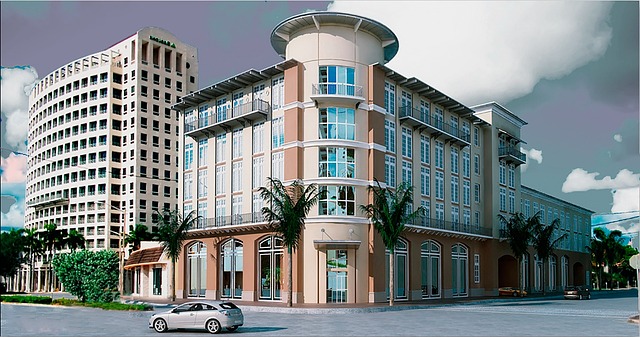Securing an Executive Condo (EC) loan in Singapore involves a comprehensive understanding of the property's remaining lease term, which affects the loan-to-value (LTV) ratio and initial capital required. Prospective EC owners must meet eligibility criteria set by the Housing & Development Board (HDB), including being Singapore Citizens or Permanent Residents and fulfilling the Minimum Occupation Period (MOP). The tenure-to-income ratio (TDSR) also caps monthly mortgage repayments at 60% of an individual's income, ensuring prudent financial management. It is crucial to thoroughly compare mortgage plans from various banks, considering interest rates, loan tenures, and additional benefits. Post-approval, diligent financial management, including budgeting for amortization installments and potential future expenses, and monitoring market trends for refinancing opportunities, are essential for maintaining the financial health of your EC investment. Understanding and adhering to these Executive Condo requirements will help ensure a suitable mortgage that aligns with your long-term financial objectives.
navigating the path to homeownership within Singapore’s unique real estate landscape, understanding the intricacies of an Executive Condo (EC) mortgage is paramount. This article demystifies the process, from eligibility criteria to prudent mortgage management. Prospective EC owners will gain insight into the necessary financial preparations and the various mortgage plans available, ensuring a well-informed approach to securing their dream home. Whether you’re new to the property market or an experienced investor, this guide tailors to Executive Condo Requirement, providing a comprehensive overview of each stage from application to post-approval management.
- Understanding Executive Condo Eligibility Criteria
- The Step-by-Step Guide to Securing an Executive Condo Mortgage
- Assessing Your Financial Readiness for an ECO Mortgage
- Choosing the Right Mortgage Plan for Your Executive Condo
- Documentation and Application Process for ECO Financing
- Comparing Interest Rates and Terms from Different Financial Institutions
- Post-Approval: Managing Your Executive Condo Mortgage Responsibly
Understanding Executive Condo Eligibility Criteria

When considering the purchase of an Executive Condominium (EC) in Singapore, it’s crucial to first grasp the eligibility criteria set forth by the CPF Board and the Housing & Development Board (HDB). An EC is a hybrid of a public and private residential property, designed for couples who can afford more but wish to benefit from subsidies offered to public housing. To be eligible to apply for an EC, applicants must satisfy certain conditions: they should not own another flat sold by the HDB or a DBSS flat in the open market. Moreover, applicants’ combined household income should not exceed S$14,000. For those who already own a flat, they must have disposed of their previous flat at least 30 months before applying for a new EC. Additionally, both applicants must be Singapore citizens, and at least one of them must have fulfilled the minimum occupancy period (MOP) for his or her current flat. Understanding these requirements is essential as they determine your eligibility to apply for an EC loan and mortgage. The CPF Board uses these criteria to assess your financial standing and suitability for an EC mortgage, ensuring that applicants are within a bracket that can comfortably manage the repayment obligations. Prospective EC owners should refer to the most current guidelines provided by the HDB and the CPF Board to ensure they meet all eligibility criteria before proceeding with their application.
The Step-by-Step Guide to Securing an Executive Condo Mortgage

When pursuing an Executive Condo (EC) mortgage in Singapore, it’s crucial to navigate the process with a clear understanding of the requirements and steps involved. Prospective homeowners must first satisfy the Executive Condo requirement, which includes being at least 21 years old, earning a monthly income not exceeding the HDB’s latest income ceiling, and having a maximum loan tenor of 30 years or age 65, whichever comes first. These conditions are set to ensure that applicants can comfortably manage their EC mortgage payments.
The mortgage process commences with evaluating your finances to ascertain the loan quantum you’re eligible for. This involves assessing your monthly income, existing financial obligations, and the total debt servicing ratio (TDSR). Once your eligibility is confirmed, you can proceed to select an EC that fits your budget. The next step is to approach banks or financial institutions offering EC loans to compare their loan packages, interest rates, and terms. It’s advisable to obtain an in-principle approval (IPA) for your loan before making an application to purchase the EC, as this demonstrates financial commitment and can strengthen your application.
Upon obtaining the IPA, you can submit your application to buy the EC. After your application is approved by both the bank and the developer, you’ll receive an Option to Purchase (OTP) for the EC unit. With the OTP in hand, you have a limited period to secure the loan and complete the purchase. The final steps involve finalizing the loan with the financial institution, signing the mortgage deed, and completing the payment for your new Executive Condo. Throughout this process, it’s important to keep abreast of changes in EC requirements and mortgage regulations to ensure compliance and smooth transaction progression.
Assessing Your Financial Readiness for an ECO Mortgage

When considering the purchase of an Executive Condominium (EC) in Singapore, it’s crucial to thoroughly assess your financial readiness for an ECO mortgage. Prospective homeowners should start by understanding the specific requirements set out by the Credit Bureau Singapore, as a history of timely repayments is essential for mortgage approval. Additionally, potential buyers must meet the Executive Condo requirement that stipulates that applicants’ monthly income should not exceed S$14,000. This threshold ensures that ECs are accessible to middle-income families while maintaining their affordability.
Moreover, beyond income ceiling limitations, it’s important to evaluate your debt servicing ratio (DSR) and total debt servicing ratio (TDSR), which collectively cap the proportion of a borrower’s monthly income that can be used for repayment of various types of loans. A comprehensive financial analysis will include a review of your existing financial obligations, savings, and investment portfolios to ensure that you can comfortably manage an ECO mortgage without overextending yourself. This prudent approach aligns with the Monetary Authority of Singapore’s regulations aimed at responsible lending, thereby safeguarding your financial well-being in the long term.
Choosing the Right Mortgage Plan for Your Executive Condo

When considering the purchase of an Executive Condo (EC) in Singapore, selecting the right mortgage plan is a pivotal decision that can impact your finances for years to come. Prospective EC buyers must navigate the unique Executive Condo requirements set forth by the Housing & Development Board (HDB) and the Monetary Authority of Singapore (MAS). These stipulations differentiate ECs from other housing options, such as public or private properties. Understanding these conditions is crucial for securing a suitable mortgage.
Borrowers should first familiarize themselves with the EC’s lease duration—the remaining 99 years from the date of purchase—as this will affect the loan-to-value (LTV) ratio that lenders are willing to offer. A higher LTV ratio can reduce the amount of capital you need upfront, making your mortgage more accessible. Additionally, consider the tenure-to-income ratio (TDSR), which ensures that monthly repayments do not exceed 60% of your income. This guideline helps safeguard against overcommitment and financial strain. When choosing a mortgage plan, compare interest rates, loan tenures, and additional benefits from various banks to find the most compatible fit for your financial situation and repayment capacity. Always keep in mind the Executive Condo requirements as they influence both eligibility and the type of mortgage you can secure, ensuring a tailored financial plan for your EC investment.
Documentation and Application Process for ECO Financing

When exploring the Executive Condo (EC) mortgage process, understanding the documentation and application requirements for ECO financing is paramount. Prospective EC owners must first meet the eligibility criteria set by the Housing & Development Board (HDB) and the Minimum Occupation Period (MOP) stipulations. The application process commences with a comprehensive assessment of the borrower’s financial standing, which includes submitting necessary documents to the participating financial institutions. These documents typically encompass proof of income, recent bank statements, and a valuation report for the EC unit. The income criteria are structured to ensure that buyers have a stable financial foundation to manage the responsibilities of EC ownership. Moreover, applicants must possess Singapore Citizenship or Permanent Residency status, with at least one applicant being a first-time flat owner.
Navigating the ECO financing landscape requires careful attention to detail and adherence to the prescribed timelines. Applicants are advised to prepare all Executive Condo requirement documents well in advance to expedite the application process. The application package should include a fully completed loan application form, recent pay slips or proof of income, CPF statements, and identification documents for all applicants. Additionally, detailed financial planning is essential, as lenders will evaluate the loan-to-value (LTV) ratio and the total debt servicing ratio (TDSR) to ensure that the mortgage is sustainable. Prospective EC owners should engage with multiple banks or financial institutions to compare ECO financing packages, terms, and conditions to make an informed decision that aligns with their long-term financial goals.
Comparing Interest Rates and Terms from Different Financial Institutions

When embarking on the journey of securing an Executive Condo mortgage, one of the pivotal steps is to compare interest rates and terms across various financial institutions. This due diligence is crucial in optimizing the financial commitment over the tenure of the loan. Prospective homeowners should scrutinize the fine print, as different lenders offer a spectrum of rates and conditions that can significantly impact the monthly repayments and overall cost of the mortgage. It’s advisable to consider not only the headline interest rate but also the application fees, processing fees, and the range of repayment options available. Additionally, the Executive Condo requirements may vary among lenders, which can affect eligibility and the types of loans offered. For instance, some financial institutions might have more stringent criteria for loan-to-value ratios or total debt servicing ratio (TDSR) thresholds, which are essential factors in the mortgage qualification process. By comparing these aspects from multiple lenders, borrowers can identify the most favorable terms that align with their financial situation and long-term objectives, thereby making an informed decision that benefits their investment in an Executive Condo.
Post-Approval: Managing Your Executive Condo Mortgage Responsibly

Upon receiving approval for your Executive Condo (EC) mortgage, responsible management of your finances is crucial to ensure timely repayment and maintain financial health. Post-approval, it’s imperative to stay abreast of the interest rates and understand the terms and conditions stipulated in your mortgage agreement. Keep a close eye on your monthly amortization schedule to track your loan’s progress and plan for any upcoming payments. EC requirements may necessitate regular updates to your lender, particularly if there are significant changes in your financial situation. It’s also advisable to create a budget that accommodates not only your mortgage payments but also includes savings for potential property tax increases or maintenance fees. By doing so, you’ll be better equipped to handle the financial commitments associated with owning an EC and avoid any unwanted financial strain.
Moreover, it’s important to explore various strategies to reduce the burden of your mortgage over time. This could involve making lump-sum payments when possible or refinancing if market conditions permit more favorable terms. Stay informed about changes in the housing market and interest rates, as these factors can impact your mortgage’s overall cost. Additionally, consider setting up an escrow account for property taxes and insurance to ensure these payments are made on time, avoiding any lapse that could jeopardize your ownership of the EC. Proactive management of your Executive Condo mortgage post-approval will not only safeguard your financial well-being but also contribute to a secure and stable homeownership experience.
When navigating the path to securing an Executive Condo (EC) mortgage, it’s crucial for potential homeowners to understand the specific eligibility criteria that come with owning an EC in Singapore. This article has demystified the process into clear, actionable steps, ensuring applicants are well-prepared for each phase of the mortgage journey. From assessing your financial readiness and selecting the ideal mortgage plan tailored to your needs, to the meticulous documentation and application process for ECO financing, every aspect has been thoroughly covered. Prospective EC owners can confidently compare interest rates and terms from various financial institutions, armed with the knowledge to make informed decisions. Ultimately, this comprehensive guide serves as a roadmap towards managing your Executive Condo mortgage responsibly, aligning with the stringent Executive Condo requirements in place.
